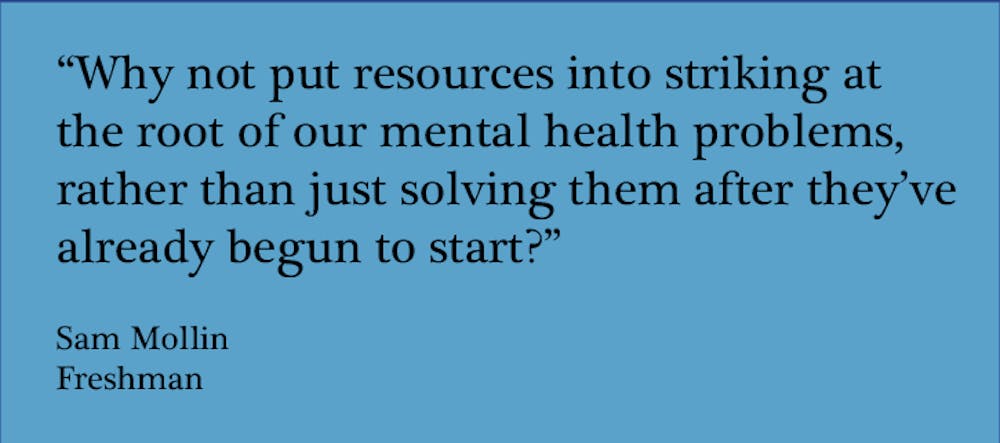It’s a well-known fact that for many people, Hopkins is a stressful school. There’s probably only one place in the world where you’ll see students streaming directly into the library after their University holds a campus-wide ceremony and light show, and that’s Hopkins! Now before I get into this, I want to emphasize that Hopkins is a great place to be, and tons of people love it here. So do I. This piece is about making a great place even better.
When I first came to Hopkins, I wasn’t really concerned with the state of our mental health. Regardless of the fact that I knew Hopkins would be difficult, I didn’t assume that we’d be subject to some sort of mental health epidemic. But as time passed, the signs started to show up. Some of my friends would brag about spending hours upon hours in the library studying, sacrificing their health and their sleep to get good grades. Others would be absolutely devastated by poor grades, fearing their entire futures would be at risk because of one bad test. In short, we’re subject to a lot of stress here at Hopkins. Of course, it isn’t just Hopkins. Most other top tier universities exhibit high levels of work-related stress as well.
However, it’s worse here than almost anywhere else. Just this month, the Task Force on Student Mental Health and Well-being released its findings after about two years of research. The Task Force formed due to pressure from the Hopkins student government association (SGA) and support from University President Ronald J. Daniels. It found that in many important aspects of mental health, Hopkins ranks worse than Ivy League universities and peer institutions. Hopkins students report feeling overwhelmed and pulling more all-nighters than students at other institutions, and a higher percentage of students say that our workload is a cause of stress compared to students at other institutions.
So what are the effects of this stress on our student body? One of the main impacts is that it can interfere with our well-being at the most vulnerable parts of our lives. As per the task force report, most mental illnesses occur between the ages of 14 and 24. People in this age cohort are more prone to impulsive decisions and instability. The main reason we’re worried about mental health, other than lowering standards of living, is the possibility of suicide. Suicide is the second highest cause of death for people aged 18-34. At Hopkins, 30 percent of undergraduates reported seriously considering suicide. I’ll repeat that again. 30 percent of undergrads (out of the 14 percent that completed the survey, so take this with a grain of salt) have seriously considered suicide.
The goal of universities across the nation is to provide an environment that gives young adults the skills, opportunities and knowledge to realize their full potential. We can’t realize our full potential if we’re not here. More than anything else, that 30 percent statistic is a call to action. What are we doing if we continue to accept an environment that drives people to consider killing themselves? We should not have a workload that makes us want to die. We should not have to sacrifice our mental health for good grades and job opportunities.
I personally don’t know the exact causes of why our schoolwork is more stressful than that of other institutions. However, one of the tasks that the Task Force needs to carry out is to investigate why and how to fix it. Most of their reforms center around forming committees and making sure that counseling services are more available on campus, but why not put resources into striking at the root of our mental health problems, rather than just solving them after they’ve already begun to start?
Why would the University take away covered grades when they’re one of the most valuable tools for adjusting to our stressful academic culture? Why wouldn’t we give more funding to our PILOT tutoring program when so many people need help? Why does the Center for Health and Wellness only have three full-time employees on a campus of 5,300 undergraduates? The Task Force has recommended a standing committee to address mental health on campus, along with a slew of other measures. It’s a good start. But let’s not just sit idly by while the administration tries to solve this on their own. We, as the student body, need to make sure that throughout this process our voices continue to be heard. We have to make sure that we’re providing feedback and giving suggestions on how to make things more manageable. Above all, we have to keep on holding the University accountable.
Sam Mollin is a freshman political science major from Mamaroneck, N.Y.





